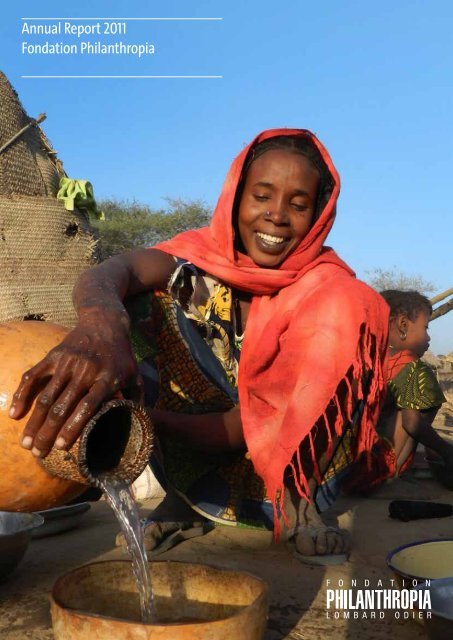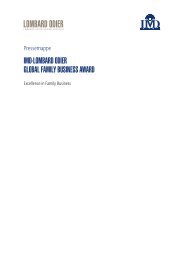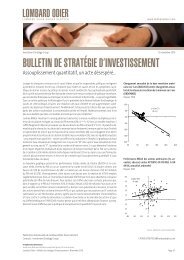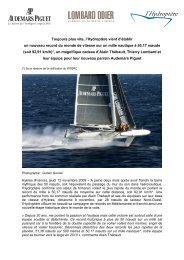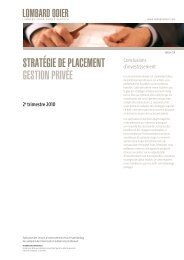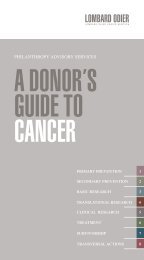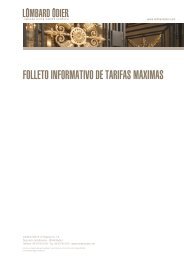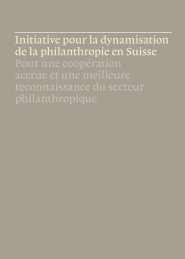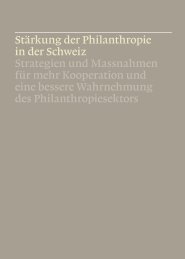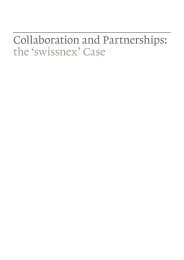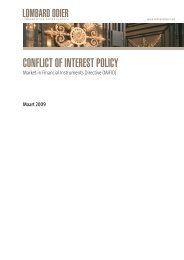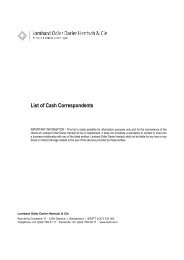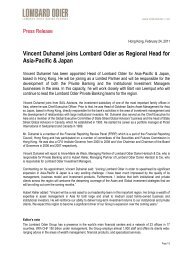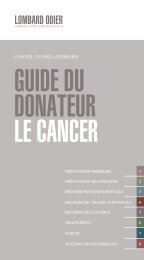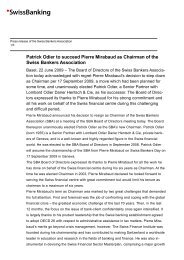Annual Report 2011 Fondation Philanthropia - Lombard Odier
Annual Report 2011 Fondation Philanthropia - Lombard Odier
Annual Report 2011 Fondation Philanthropia - Lombard Odier
Create successful ePaper yourself
Turn your PDF publications into a flip-book with our unique Google optimized e-Paper software.
<strong>Annual</strong> <strong>Report</strong> <strong>2011</strong><br />
<strong>Fondation</strong> <strong>Philanthropia</strong>
Chairman’s foreword<br />
For seven generations, the partners of<br />
<strong>Lombard</strong> <strong>Odier</strong> have shared the conviction<br />
that capital must serve society and<br />
be a positive force for change, a vision<br />
our Firm expresses not just in the way<br />
we manage our business, but also in our<br />
philanthropic commitment to the planet<br />
and the city of Geneva.<br />
Two hundred years of social commitment have<br />
taught us that giving is a wonderful yet challenging<br />
art. That is why we decided to share our philanthropic<br />
experience and expertise with our clients<br />
through philanthropic advisory services rooted in<br />
our own tradition of giving. We offer support in<br />
designing giving strategies that meet philanthropic<br />
aspirations, in selecting the right donation method<br />
and in enhancing impact on the ground.<br />
As part of these philanthropic advisory services,<br />
we have created <strong>Fondation</strong> <strong>Philanthropia</strong>, a dedicated<br />
umbrella structure to make giving easier and<br />
more secure. It consists of a simple, flexible vehicle,<br />
drawing on a wide range of skill sets and offering<br />
tailored solutions to the sometimes complex but<br />
always very personal journey that is philanthropy.<br />
In this second annual report, we are proud to pay<br />
tribute to the numerous projects that the Foundation<br />
has supported and to its donors whose<br />
generosity has not wavered despite the current<br />
economic difficulties. The many projects supported<br />
by <strong>Fondation</strong> <strong>Philanthropia</strong> offer very concrete<br />
proof of our clients’ dynamic and diverse commitment<br />
to a fairer, more responsible, and more<br />
sustainable world.<br />
Thierry <strong>Lombard</strong><br />
Chairman of the Board of <strong>Fondation</strong><br />
<strong>Philanthropia</strong><br />
3
Contents<br />
About us<br />
8 Our mission<br />
9 Our strengths<br />
10 Our approach<br />
11 Our structure<br />
Perspectives on the added value<br />
of umbrella foundations<br />
16 Interview with Karin Jestin, Board<br />
Member of <strong>Fondation</strong> <strong>Philanthropia</strong> and<br />
Benoît Merkt, partner of the law firm<br />
Lenz & Staehelin<br />
Activity report <strong>2011</strong><br />
20 Our grants<br />
24 Our beneficiaries<br />
30 Our funds<br />
Our thematic funds: a selection<br />
of projects<br />
34 The Kenya Red Cross Society<br />
Responding to the food crisis<br />
Interview with Abbas Gullet, Secretary<br />
General of Kenya Red Cross Society<br />
38 Centre de la Mémoire<br />
Supporting research into neurodegenerative<br />
diseases<br />
Interview with Prof. Patrick Aebischer,<br />
President of the Swiss Federal Institute<br />
of Technology in Lausanne and Professor of<br />
Neurosciences<br />
42 Equipes Saint-Vincent<br />
Promoting literacy among vulnerable<br />
immigrant women<br />
44 SOS SAHEL<br />
Fostering sustainable agriculture<br />
and fighting against desertification<br />
Our personal funds: a selection<br />
48 Personalized gift fund: Blaise Lenoir<br />
scholarship<br />
Interview with Katia Cruz, 2009 winner<br />
50 Donor-advised fund: Carlo fund<br />
Interview with the donor<br />
54 Donor-advised fund: Citrina Fund<br />
An expert’s view of the impact of grantmaking<br />
foundations<br />
56 Interview with Beate Eckhardt,<br />
Secretary General of SwissFoundations<br />
Stand Proud beneficiary<br />
in the Democratic Republic of Congo 5
About us<br />
Micro-entrepreneur supported by the Association<br />
for right to economic initiative (Adie)
Our mission<br />
To facilitate and realize our clients’<br />
philanthropic commitments<br />
In 2008 we created <strong>Fondation</strong> <strong>Philanthropia</strong>, an<br />
umbrella foundation and registered Swiss charity,<br />
to assist and support donors in their philanthropic<br />
commitments.<br />
<strong>Fondation</strong> <strong>Philanthropia</strong> is an active, dedicated<br />
and exclusive partner that makes philanthropy<br />
simpler and easier for donors.<br />
What is an umbrella<br />
foundation?<br />
An umbrella foundation is an independent<br />
foundation that enables donors to realize their<br />
philanthropic aspirations by contributing to existing<br />
pooled funds or by creating their own personal<br />
funds.<br />
<strong>Fondation</strong> <strong>Philanthropia</strong> is based on this model.<br />
It gives donors the opportunity to support<br />
good causes through its thematic funds or to<br />
undertake more personal projects on a strategic<br />
and permanent basis by creating customized funds<br />
tailored to the donor’s wishes.<br />
8<br />
Our philanthropic tradition<br />
stems from our concern for others.
Our strengths<br />
Tradition<br />
The Firm’s philanthropic tradition has been built,<br />
developed, and strengthened by the seven generations<br />
of partners who have headed <strong>Lombard</strong> <strong>Odier</strong><br />
for over 200 years. It is a tradition that is embedded<br />
in our philosophy and our values and is key to our<br />
long-term approach and focus on our responsibility<br />
to society and future generations.<br />
Expertise<br />
Donors can draw on the services of a multi-disciplinary<br />
team entirely dedicated to philanthropy.<br />
Alongside our legal and financial experts, our philanthropy<br />
advisors use their deep knowledge of the<br />
sector to find the solutions best suited to donors’<br />
aims and seek to maximize the effectiveness and<br />
impact of their donations.<br />
Support<br />
As philanthropy is often a very personal matter,<br />
each of our donors receives individual support and<br />
assistance within <strong>Fondation</strong> <strong>Philanthropia</strong>. Trust is<br />
key to the support and to the close relationship that<br />
we build with our donors every step of the way,<br />
from identification of their goals, to selection and<br />
monitoring of the projects that are a true fit<br />
for their ambitions.<br />
Continuity<br />
Some donors are extremely keen to ensure that<br />
their philanthropic commitment is long-lasting<br />
and to protect it from changes in governance and<br />
regulations and from possible succession problems.<br />
<strong>Fondation</strong> <strong>Philanthropia</strong>, which enjoys the backing<br />
of a bicentenary institution, offers the best assurance<br />
that our donors’ wishes and objectives will<br />
continue to be honored year after year.<br />
9
Our approach<br />
Simplicity<br />
We make philanthropy simpler and easier by offering<br />
different ways of giving:<br />
Thematic funds for donors wishing to promptly<br />
support pre-selected projects.<br />
Sheltered funds for donors wanting to be more<br />
actively involved in choosing projects and allocating<br />
their donations.<br />
All the solutions proposed by <strong>Fondation</strong> <strong>Philanthropia</strong><br />
allow to reduce administrative tasks and<br />
operating costs.<br />
Freedom<br />
Our approach aims to maintain donors’ freedom<br />
of choice, to respect their intentions and desire<br />
for personal involvement and their wish for either<br />
privacy or public association with the projects they<br />
support.<br />
Donations can take various forms, all of which<br />
combine resource flexibility with assurance of<br />
lasting impact.<br />
10<br />
Simplicity and freedom –<br />
the two facets of our approach
Our structure<br />
<strong>Fondation</strong> <strong>Philanthropia</strong><br />
offers unique advantages that<br />
stem from the philanthropic<br />
engagement of the Partners<br />
and of the Firm 11
Contributing via thematic funds<br />
Thematic funds provide a simple, quick,<br />
and secure way of donating in complete<br />
confidence by selecting from among<br />
four areas of intervention. <strong>Fondation</strong><br />
<strong>Philanthropia</strong> selects the organizations<br />
to be supported and can take action,<br />
depending on the situation, at local,<br />
regional, or international level.<br />
Moreover, the pooling of funds allows<br />
to increase the impact of each donor,<br />
irrespective of the size of their donation.<br />
Humanitarian<br />
and social issues<br />
Whether it’s responding to emergencies (conflicts,<br />
natural disasters, crises) or dealing in the long term<br />
with poverty and vulnerability, humanitarian and<br />
social action is vital at a time when so many people<br />
have no access to essential services such as food,<br />
health, housing, education, jobs etc.<br />
Scientific<br />
and medical research<br />
Scientific and medical research has saved millions<br />
of lives, increased life expectancy world-wide, and<br />
improved the living conditions of many communities.<br />
By supporting research, we can push forward<br />
the boundaries of knowledge and discover some of<br />
the solutions to our problems.<br />
12<br />
Culture<br />
and education<br />
Culture and education are fundamental to human<br />
development. Transmitting knowledge and sharing<br />
a common culture are essential not just for social<br />
progress and cohesion, they also offer individuals a<br />
chance to control their own destinies and create a<br />
new future for their communities and themselves.<br />
Environment and<br />
sustainable development<br />
Demographic growth and current models of economic<br />
development are putting increasing pressure on<br />
our fragile environment. Deforestation, pollution,<br />
climate change, overexploitation of natural<br />
resources, and decreasing biodiversity are just some<br />
of the many threats to our planet.
S’engager Committing à travers via personal funds<br />
les Fonds Abrités<br />
<strong>Fondation</strong> <strong>Philanthropia</strong>’s personal<br />
funds are more tailored solutions that<br />
allow donors to become involved – with<br />
confidence and in the long-term– in the<br />
intervention areas they have themselves<br />
selected.<br />
Personalized<br />
gift funds<br />
Donors can create a specific fund to tackle an issue<br />
or to support a cause that is particularly important<br />
to them. The donor decides the amount of support<br />
required - which can range from basic administrative<br />
support, to the selection and monitoring<br />
of beneficiary organizations - and can name the<br />
fund and run communication campaigns about its<br />
activities.<br />
Donor-advised<br />
funds<br />
A donor-advised fund requires greater personal<br />
involvement by the donor in both the design and<br />
the management of the philanthropic endeavor.<br />
Donors can choose the areas and projects to be<br />
supported and can change the fund’s purpose<br />
over time. They can also associate family, friends,<br />
and experts by creating an advisory committee to<br />
make recommendations to the Board of Trustees of<br />
<strong>Fondation</strong> <strong>Philanthropia</strong>.<br />
13
Our governance<br />
The Board of Trustees<br />
The Board of Trustees ensures that <strong>Fondation</strong><br />
<strong>Philanthropia</strong> is run well, fulfills its missions and<br />
complies at all times with the wishes of each donor.<br />
It meets four times a year and its members, who<br />
have complementary skills, are all very personally<br />
committed to philanthropy.<br />
Thierry <strong>Lombard</strong><br />
Chairman, Managing Partner<br />
of <strong>Lombard</strong> <strong>Odier</strong> & Cie.<br />
A sixth generation partner, Thierry <strong>Lombard</strong> has<br />
published numerous books on family-run companies,<br />
philanthropy and investment. He sits on<br />
the boards of several companies, foundations and<br />
associations, especially in the humanitarian and<br />
environmental fields. He also chairs the ‘ICRC Corporate<br />
Support Group’ and Family Business Network.<br />
Anne-Marie de Weck<br />
Deputy Chair, Managing Partner of<br />
<strong>Lombard</strong> <strong>Odier</strong> & Cie.<br />
Anne-Marie de Weck has a legal background and<br />
has headed the Private Clients Unit since 1999. She<br />
is personally committed to numerous philanthropic<br />
initiatives, especially in the field of culture and arts.<br />
14<br />
Denis Pittet<br />
Secretary, Partner of the Private Holding company<br />
and Head of the Legal, Fiscal & Compliance Department<br />
at <strong>Lombard</strong> <strong>Odier</strong> & Cie.<br />
Denis Pittet brings a wealth of legal and tax expertise<br />
to the Board. He is involved personally and with<br />
his family in several philanthropic projects.<br />
Karin Jestin<br />
Board Member, Secretary General of <strong>Fondation</strong><br />
<strong>Lombard</strong> <strong>Odier</strong>.<br />
A member of several foundation boards, Karin<br />
Jestin joined the board of SwissFoundations, the<br />
association of Swiss grant-making foundations, in<br />
<strong>2011</strong>. She brings to the Board her hands-on view and<br />
operational expertise in the humanitarian sector,<br />
especially within the International Federation of Red<br />
Cross and Red Crescent Societies.<br />
The members of the Board of the Foundation act<br />
on a purely voluntary basis.<br />
The main mission of the Foundation<br />
Board is to ensure that donors’<br />
wishes are respected over the<br />
long term.<br />
Anne-Marie de Weck
The selection process<br />
Projects submitted to the Board of <strong>Fondation</strong><br />
<strong>Philanthropia</strong> have already been through rigorous<br />
research and due diligence. Together with each<br />
donor, our philanthropy experts draw a giving strategy<br />
and then research, analyse and select projects<br />
accordingly.<br />
Projects are finally submitted to the Board<br />
for approval to ensure they match the donor’s<br />
aspirations and wishes.<br />
Transparency<br />
<strong>Fondation</strong> <strong>Philanthropia</strong> is a registered charity<br />
subject to Swiss supervision. It publishes an annual<br />
report addressed to donors and other stakeholders<br />
that details its activities and the projects it supports.<br />
Customized reports are also available<br />
to donors on request.<br />
Trust is the key to an effective<br />
relationship and it is our job to<br />
ensure donors share that trust.<br />
Denis Pittet<br />
Thierry <strong>Lombard</strong><br />
Anne-Marie de Weck<br />
Denis Pittet<br />
Karin Jestin<br />
15
Perspectives on the added value<br />
of umbrella foundations<br />
Interview with Karin Jestin, member of the Board of <strong>Fondation</strong><br />
<strong>Philanthropia</strong> and Benoît Merkt, partner in the law firm Lenz & Staehelin<br />
How are donors and Swiss philanthropy in general<br />
bearing up in these financially unstable times?<br />
Benoît Merkt<br />
From my work as legal advisor to donors and<br />
foundations, I get the impression that the recession<br />
has not so much put the brakes on philanthropy<br />
itself as impacted how it works. There is clearly<br />
an awareness that the funds available are limited,<br />
synergies are needed, the best use must be made<br />
of existing resources and that wherever possible<br />
administrative costs must be cut and the impact of<br />
donations improved.<br />
What difficulties might donors face?<br />
Karin Jestin<br />
Potential donors need to answer a number of questions<br />
and then draw up a roadmap. First of all, they<br />
have to identify the cause or causes that interest<br />
them and the type of organization they would like<br />
to support. But they also need to decide how personally<br />
involved they or their families wish to be. This<br />
is where philanthropic advice comes in, making the<br />
process easier – we listen to donors’ concerns and<br />
support them throughout the process to help them<br />
achieve their goals and enhance the impact<br />
of their donations.<br />
16<br />
What criteria should donors take into account<br />
before deciding their donation method?<br />
Benoît Merkt<br />
At the legal level, donors must ensure that they<br />
structure their donations to be tax-deductible. Individuals<br />
resident in Switzerland who make a donation<br />
to an umbrella foundation that is tax-exempt in<br />
Switzerland – such as <strong>Fondation</strong> <strong>Philanthropia</strong> – can<br />
deduct the amount from their annual net income.<br />
In Geneva and most other Swiss cantons, the ceiling<br />
for tax-exempt donations is 20% of the donor’s net<br />
income. On the contrary, donations made by Swiss<br />
residents to foreign-registered charities are not<br />
tax-deductible.<br />
In the case of substantial donations, donors must<br />
also ensure that the contractual framework for<br />
their grants is carefully drafted. It is often advisable<br />
to draw up a grant agreement specifying the<br />
beneficiary’s legal obligations, especially in terms<br />
of activity reports, results and, depending on the<br />
donor’s wishes, either confidentiality or publicity.<br />
Potential donors need to answer a<br />
number of questions and then draw<br />
up a roadmap.<br />
Karin Jestin
So why use an umbrella foundation?<br />
Karin Jestin<br />
Umbrella foundations such as <strong>Fondation</strong> <strong>Philanthropia</strong><br />
offer donors several advantages: they can be<br />
sure that their donation will have a lasting impact;<br />
they enjoy lower administrative fees because the<br />
donations are pooled; they can choose their level<br />
of involvement; and they can decide to donate<br />
through one of our thematic or personal funds<br />
while receiving professional philanthropic expertise.<br />
There is clearly an awareness that<br />
synergies are needed, the best use<br />
must be made of existing resources<br />
and that wherever possible administrative<br />
costs must be cut and<br />
the impact of donations improved.<br />
Benoît Merkt 17
Activity report<br />
The Gustave Roussy Institute hosts over 300 researchers
Analysis of grants<br />
In <strong>2011</strong>, <strong>Fondation</strong> <strong>Philanthropia</strong> distributed grants<br />
totaling over CHF 2,240,000 to 30 organizations.<br />
It also committed CHF 1,038,000 to future grants.<br />
<strong>Fondation</strong> <strong>Philanthropia</strong> activities showed real<br />
continuity from 2010 and an upswing in grants.<br />
20<br />
Futures commitments taken over the year<br />
Grants allocated including past commitments<br />
Grants by theme<br />
The breakdown of grants by theme largely reflects<br />
the difficulties that marked <strong>2011</strong>. The economic<br />
crisis and natural and humanitarian disasters were<br />
of great concern to donors and had a big impact<br />
on how grants were allocated.<br />
In <strong>2011</strong>, as in 2010, the main focus was on humanitarian<br />
and social themes as per the wish to<br />
provide assistance during dangerous times and<br />
to the victims of humanitarian disasters.<br />
Humanitarian and social issues (50%)<br />
Medical and scientific research (35%)<br />
Culture and education (7.5%)<br />
Environment and sustainable development (7.5%)
Types of projects<br />
Compared with 2010, a much wider variety of<br />
projects was supported. There was a clear preference<br />
for two types of intervention. While donors<br />
chose projects whose key mission is directly<br />
to strengthen the local skills of the beneficiary<br />
organizations, they also showed greater interest<br />
in research which allows to obtain a better understanding<br />
of particular problems.<br />
Capacity building (31%)<br />
General contribution (6%)<br />
Scholarship and prize (6%)<br />
Training (8%)<br />
Research (31%)<br />
Assistance (10%)<br />
Advocacy (8%)<br />
21
Size of beneficiary<br />
organizations<br />
Our grant strategy is driven primarily by the<br />
desire to support donors’ aspirations by selecting<br />
organizations able to achieve those aspirations.<br />
We base our decisions mainly on quality and<br />
relevance and organization size is not a selection<br />
criterion as such.<br />
This means that a wide variety of organizations<br />
are supported, with annual budgets ranging<br />
from less than CHF 500,000 to more than<br />
CHF 10 million.<br />
22<br />
(in CHF)<br />
up to 0.5M (31%)<br />
from 0.5M to 1M (24%)<br />
from 1M to 10M (14%)<br />
over 10M (31%)<br />
Geographical distribution<br />
of supported projects<br />
The growing economic uncertainty and vulnerability<br />
that shaped <strong>2011</strong> prompted our donors to give<br />
greater support to projects close to home, leading<br />
to a greater number of grants being allocated to<br />
Switzerland and France.<br />
Nonetheless, donors continued to react strongly<br />
to ecological and humanitarian emergencies,<br />
particularly in the Horn of Africa, which suffered<br />
a very severe famine in <strong>2011</strong>.<br />
In <strong>2011</strong> our grants benefitted projects<br />
in ten different countries.
Relationships with<br />
beneficiary organizations<br />
The number of organizations supported remained<br />
unchanged from 2010 but relationships with<br />
partners strengthened thanks to the reporting<br />
and monitoring system. This was complemented<br />
by field visits whenever the opportunity arose.<br />
As most donors opt for long-term donations,<br />
the Foundation is able to support projects over<br />
several years and develop long-term, trust relationships<br />
with its partners.<br />
Relationships with<br />
partners continue to<br />
strengthen and develop 23
Organizations supported in <strong>2011</strong><br />
In <strong>2011</strong>, <strong>Fondation</strong> <strong>Philanthropia</strong> supported<br />
30 organizations in several<br />
regions of the world and in various fields<br />
through its thematic and personal funds.<br />
Europe<br />
Association pour le droit à l’initiative économique<br />
(Adie) – France<br />
Providing microcredit and personalized support<br />
to entrepreneurs<br />
Supported by the Humanitarian and Social thematic<br />
fund, Adie enables the unemployed and marginalized<br />
to create their own businesses and jobs<br />
through microcredit and personalized support.<br />
In <strong>2011</strong>, <strong>Fondation</strong> <strong>Philanthropia</strong> continued its threeyear<br />
commitment (2010-2012) to the training of<br />
volunteers who will support the new entrepreneurs<br />
in their career development.<br />
Autisme, Piano et Thérapie Éducative<br />
(APTE) – France<br />
Helping autistic people overcome their disability<br />
The Etincelles personalized gift fund supports APTE,<br />
which helps people in the Paris region who suffer<br />
from an autistic spectrum disorder. The program is<br />
based on the use of music, especially the piano, as<br />
well as other forms of educational therapy.<br />
24<br />
Apprentis d’Auteuil<br />
Apprentis d’Auteuil – France<br />
Educating and training young people<br />
Supported by the Humanitarian and Social thematic<br />
fund, Apprentis d’Auteuil provides education and<br />
training to over 13,000 young people in difficult<br />
situations and helps them to integrate into society<br />
as free, responsible adults. The young people are<br />
brought to the association by their families or the<br />
child welfare services. Apprentis d’Auteuil offers 66<br />
professional training courses in its 200 establishments<br />
in France.<br />
In <strong>2011</strong>, <strong>Fondation</strong> <strong>Philanthropia</strong> made a four-year<br />
commitment (<strong>2011</strong>-2014) to support the financing<br />
of international solidarity youth camps.<br />
Association Bouée d’espoir – France<br />
Fighting against exclusion<br />
The Humanitarian and Social thematic fund<br />
supports Bouée d’espoir, which combats exclusion<br />
by offering “lifebuoys” (small financial grants)<br />
to people in dire need via its partners, which are<br />
private and public organizations with recognized<br />
expertise in supporting those in distress.<br />
In <strong>2011</strong> <strong>Fondation</strong> <strong>Philanthropia</strong> continued its<br />
eight-year support (2010-2017) to the association’s<br />
activities.
Association Himalaya en Bourgogne – France<br />
Preserving cultural heritage<br />
The Etincelles personalized gift fund supports this<br />
association in the reconstruction of the Bhutanese<br />
Pavilion, which was displayed at Expo 2000 in Hanover<br />
and acquired by the town hall of La Boulaye, a<br />
village in Burgundy.<br />
Association Parkinson Suisse – Switzerland<br />
Helping provide information about the disease<br />
The Gustaaf Hamburger donor-advised fund supports<br />
Parkinson Suisse, which provides information<br />
to patients, their families and the general public<br />
about Parkinson’s disease. It offers advice and<br />
support to the 15,000 people affected throughout<br />
Switzerland by organizing consultations, information<br />
sessions, courses, seminars and respite<br />
holidays.<br />
The fund supported the association’s information<br />
and communication work by providing two-year<br />
funding (<strong>2011</strong>-2012) for the publication of its magazine<br />
and brochure.<br />
Adie<br />
Bureau universitaire d’information sociale<br />
(BUIS) – Switzerland<br />
Supporting a medical scholarship program<br />
in Geneva<br />
The Hussenstein personalized gift fund, in<br />
partnership with BUIS, set up a scholarship for<br />
medical students at the University of Geneva which<br />
supports them throughout all their studies.<br />
The first two students were awarded a scholarship<br />
in <strong>2011</strong>.<br />
Centre Corot – France<br />
Helping socially excluded young people in Ile-de<br />
France<br />
The Humanitarian and Social thematic fund supports<br />
Centre Corot Entraide d’Auteuil. The centre offers<br />
accommodation and support to young homeless<br />
people aged 18-24 in Paris, as well as social support<br />
to underprivileged families, and clothing for men,<br />
women, and children.<br />
In <strong>2011</strong>, as a result of a grant to Tremplin, a pilot<br />
project, ten young people received the equivalent of<br />
1,820 days of support allowing them to find jobs and<br />
access appropriate housing solutions.<br />
Centre de la Mémoire – Switzerland<br />
Supporting research into neurodegenerative<br />
diseases<br />
The Medical and Scientific Research thematic fund<br />
supports this project, described on page 38.<br />
25
Organizations supported in <strong>2011</strong><br />
Europe<br />
Geneva Red Cross – Switzerland<br />
Helping underprivileged people in Geneva<br />
The Humanitarian and Social thematic fund<br />
supports the Geneva Red Cross, the cantonal<br />
association of the Swiss Red Cross. Its mission is<br />
to provide local support to the people in Geneva.<br />
The organization focuses on helping young people,<br />
families, the elderly, and migrants.<br />
The <strong>2011</strong> grant enabled the purchase of a washingmachine<br />
and tumble-dryer for a home for youths.<br />
Equipes Saint-Vincent – France<br />
Promoting literacy among vulnerable immigrant<br />
women<br />
The Humanitarian and Social thematic fund supports<br />
this project, described on page 42.<br />
26<br />
FiBL<br />
Marcel Benoist Foundation – Switzerland<br />
Promoting science in Switzerland<br />
The Medical and Scientific Research thematic fund<br />
supports the Marcel Benoist Foundation, created in<br />
1920 by the Swiss Federal Council to carry out the<br />
last wishes of a French lawyer resident in Lausanne.<br />
Over time, the Marcel Benoist Award has become<br />
Switzerland’s biggest science award. Due to its<br />
close connection with the government, the renown<br />
of previous winners, and the gradual expansion of<br />
fields eligible for the award, it has become muchcoveted<br />
by Swiss scientists.<br />
<strong>Fondation</strong> <strong>Philanthropia</strong> has given a two-year commitment<br />
(2010-<strong>2011</strong>) to supporting the prize money.<br />
Fundación Putxet – Spain<br />
Helping the institution support vulnerable immigrants<br />
The Solidarité donor-advised fund supports this<br />
Spanish institution, which is based in Barcelona and<br />
offers general aid, administrative support, and jobseeking<br />
guidance to vulnerable immigrants.
LEV TOV – France<br />
Helping the underprivileged<br />
The Etincelles personalized gift fund supports this<br />
organization, which provides social support to<br />
underprivileged members of the Jewish community<br />
in La Haye-les-Roses.<br />
Œuvre de la Mie de Pain – France<br />
Setting up a multimedia platform for the socially<br />
excluded<br />
The Humanitarian and Social thematic fund<br />
supports this association, which helps the homeless<br />
and deprived in the Paris region. It provides<br />
assistance to the extremely vulnerable (emergency<br />
assistance, food, and shelter) and helps guide them<br />
toward social and professional integration.<br />
In <strong>2011</strong> <strong>Fondation</strong> <strong>Philanthropia</strong> supported the<br />
design of a multi-partner platform that will help<br />
the organization and its partners track and more<br />
efficiently help their beneficiaries.<br />
Plugarts – France<br />
Supporting the marginalized<br />
The Etincelles personalized gift fund supports a<br />
writing and musical composition workshop for<br />
people in the Paris region who are marginalized<br />
or have disabilities.<br />
Plugarts<br />
ProSpecieRara – Switzerland<br />
Protecting biodiversity in Switzerland<br />
The Carlo donor-advised fund supports ProSpecieRara,<br />
which has been working since 1982 to safeguard<br />
and protect the biodiversity of local animal and<br />
plant species threatened with extinction by the<br />
industrialization of Swiss agriculture and animal<br />
husbandry.<br />
<strong>Fondation</strong> <strong>Philanthropia</strong> supports the association’s<br />
activities in French-speaking Switzerland by helping<br />
to strengthen its team.<br />
Research Institute of Organic Agriculture (FiBL) –<br />
Switzerland<br />
Financing research into the reduction of bovine<br />
stress<br />
The Carlo donor-advised fund supports this research<br />
institution, described on page 53.<br />
SOS Amitié – France<br />
Improving programs to support those in distress<br />
The Humanitarian and Social thematic fund<br />
supports SOS Amitié, a suicide-prevention association<br />
with a 24/7 telephone helpline manned by<br />
volunteers who help combat the isolation, solitude,<br />
malaise and depression of callers.<br />
<strong>Fondation</strong> <strong>Philanthropia</strong> has helped set up a statistical<br />
program to help SOS Amitié better understand<br />
its target group and accurately map current<br />
problems.<br />
27
Organizations supported in <strong>2011</strong><br />
Africa<br />
African Institute for Mathematical Sciences<br />
(AIMS) – South Africa<br />
Supporting a scholarship program in South Africa<br />
The Hanan personalized gift fund supports AIMS.<br />
Founded in 2003, the institute aims to train the next<br />
generation of African mathematicians to move the<br />
continent forward in the sciences and economics.<br />
A talent-based scholarship system allows fairer<br />
access. AIMS has been so successful that an identical<br />
system has been created in Senegal.<br />
The fund’s contribution has financed 5 scholarships.<br />
Hospital El Carmelo – Mozambique<br />
Supporting the hospital’s social and medical work<br />
The Solidarité donor-advised fund supports El<br />
Carmelo Hospital in Mozambique, managed by<br />
the Sisters of Charity of Saint-Vincent de Paul. The<br />
hospital provides key medical and social services<br />
to the community.<br />
In <strong>2011</strong> the fund continued its commitment to the<br />
hospital and helped develop the bakery it runs for<br />
its patients and the local community. This long-term<br />
commitment has been ongoing since 2009.<br />
Kenya Red Cross Society – Kenya<br />
Responding to the food crisis<br />
The Humanitarian and Social thematic fund supports<br />
this project, described on page 34.<br />
28<br />
AIMS<br />
Stand Proud – Democratic Republic of Congo<br />
Helping disabled children to walk.<br />
The Humanitarian and Social thematic fund supports<br />
Stand Proud, which provides free surgeries,<br />
braces and rehabilitation to handicapped children in<br />
the Democratic Republic of Congo.<br />
The grant allowed to renew support to the work<br />
of the Kinshasa, Kalemie, and Lubumbashi centers-<br />
assisting some 1,000 children - and to the expansion<br />
of the management team.<br />
The Green Belt Movement – Kenya<br />
Mobilizing local communities to conserve the forests<br />
The Hanan personalized gift fund supports this<br />
NGO founded in 1977 by Wangari Muta Maathai, the<br />
2004 winner of the Nobel Peace Prize. The Green<br />
Belt Movement works for the reforestation<br />
of Kenya’s green belt and for the prevention of<br />
desertification and soil erosion by involving women<br />
in rural areas, contributing to their emancipation.<br />
The grant supported 10 tree nurseries in the<br />
Mathira district. Thanks to a matching grant from<br />
another foundation, the original grant was doubled<br />
to finance the planting of around 30,000 trees.<br />
Union for International Cancer Control (UICC) –<br />
Nigeria<br />
Promoting access to pain-relief treatments in Nigeria<br />
The Citrina donor-advised fund supports this project,<br />
described on page 54.
SOS SAHEL – Sahel<br />
Promoting sustainable agriculture in the fight<br />
against desertification<br />
The Humanitarian and Social thematic fund supports<br />
this project, described on page 44.<br />
Vétérinaires sans Frontières – Democratic Republic<br />
of Congo<br />
Reintegrating demobilized child soldiers through<br />
goat-rearing<br />
The Carlo donor-advised fund supports this project,<br />
described on page 52.<br />
WaterAid – Mali<br />
Improving access to drinking water, sanitation<br />
and hygiene<br />
The Hanan personalized gift fund supports WaterAid,<br />
which provides drinking water and sanitation to the<br />
most underprivileged peoples across the world, as<br />
well as promoting hygiene.<br />
In <strong>2011</strong> the fund renewed its support for the Mali<br />
rural program. The Mali project combines the<br />
building of drinking water and sanitation systems<br />
with hygiene education programs for local communities.<br />
The project will ultimately provide access<br />
to drinking water for 26,600 people and access to<br />
sanitation for 28,200 people.<br />
Institut Pasteur<br />
Global<br />
Institut Pasteur<br />
Research into a vaccine against cancer<br />
The Medical and Scientific Research thematic<br />
fund supports the Institut Pasteur. After ten years<br />
researchers have succeeded in stimulating immune<br />
system responses to certain tumors, paving the<br />
way for the development of cancer vaccines. The<br />
challenge now is to prepare the candidate vaccine<br />
for clinical trials: a feasibility study for industrial<br />
production of the vaccine using chemical synthesis,<br />
production of a clinical batch, toxicology study, and<br />
then the first human trials.<br />
<strong>Fondation</strong> <strong>Philanthropia</strong> extended its three-year<br />
commitment (2010-2012) to allow the institute to<br />
continue research on the vaccine up to clinical trials.<br />
Institut Gustave Roussy<br />
Promoting a personalized approach to cancer<br />
The Florena personalized gift fund supports the<br />
Institut Gustave Roussy, one of the world’s leading<br />
cancer-research institutes and the Europe’s biggest<br />
dedicated oncology health centre.<br />
The fund supported the Cancer Revolution Campaign<br />
promoting research into personalized cancer<br />
treatment.<br />
29
Personal funds<br />
In <strong>2011</strong>, <strong>Fondation</strong> <strong>Philanthropia</strong> had<br />
15 personal funds: ten personalized<br />
gift funds and five donor-advised<br />
funds.<br />
A total of six new funds were set up<br />
during the year: five personalized gift<br />
funds and one donor-advised fund.<br />
Personalized gift funds<br />
Aidhandicap (created in <strong>2011</strong>)<br />
The fund’s aim is to help the job-market integration<br />
of those with moderate disabilities.<br />
Association du Bon Secours<br />
The fund’s present aim is to support former pupils<br />
of the Ecole du Bon Secours in Geneva (now called<br />
Haute Ecole de Santé). Later, the fund will support<br />
humanitarian and social projects.<br />
Blaise Lenoir scholarship<br />
This fund is described on page 48.<br />
Etincelles<br />
The fund’s aim is to support public organizations<br />
with humanitarian objectives. The fund’s area<br />
of work is vast and includes: the fight against<br />
disease, addictions, and hunger; promoting<br />
human dignity; helping the underprivileged,<br />
disabled, and socially excluded; providing access<br />
to education and promoting the development<br />
of all forms of culture.<br />
30<br />
Fonds Hanan<br />
Florena (created in <strong>2011</strong>)<br />
The fund supports large-scale projects to restore<br />
and promote cultural heritage. Florena is also<br />
involved in fighting against cancer by supporting<br />
research, training and patient assistance.<br />
Hanan (created in <strong>2011</strong>)<br />
This funds scope includes education, demographic<br />
ageing and wildlife protection.<br />
Hussenstein<br />
This fund allocates scholarships for medical<br />
students at the University of Geneva who are<br />
struggling to finance their studies. The particular<br />
focus of this fund is on developing the relationship<br />
aspect of the medical profession.<br />
International pour la Musique (created in <strong>2011</strong>)<br />
The fund took over the activities of the former<br />
<strong>Fondation</strong> Internationale Pour la Musique,<br />
supporting the Centre International Nadia et Lili<br />
Boulanger. It finances scholarships and grants to<br />
young musicians and composers and contributes<br />
to the Centre’s new development projects.
Karuna Shechen<br />
A perennial fund in favour of the Karuna Shechen<br />
organization, headed by Matthieu Ricard, which<br />
tackles issues such as access to education and<br />
primary healthcare in the Himalayan region.<br />
Pierre et Yvonne Lebesgue (created in <strong>2011</strong>)<br />
The fund focuses on providing assistance to<br />
people with disabilities in Switzerland.<br />
Fonds Karuna Shechen<br />
Donor-advised funds<br />
Carlo<br />
This fund is described on page 50.<br />
Citrina<br />
This fund is described on page 54.<br />
Gustaaf Hamburger<br />
The fund took over the activities of the former<br />
<strong>Fondation</strong> Gustaaf Hamburger, providing financial<br />
support to people suffering from Parkinson’s<br />
disease and their families and training carers.<br />
It also assists associations working on this disease<br />
and scientific institutions and researchers dedicated<br />
to research in this field.<br />
Solidarité<br />
This fund is focused on supporting regional,<br />
national, and international institutions assisting<br />
the most underprivileged. The fund backs projects<br />
that help children, young adults, the elderly, and<br />
the disabled.<br />
SOMI (created in <strong>2011</strong>)<br />
The fund provides support to the arts, with a<br />
particular focus on contemporary music.<br />
31
Thematic funds:<br />
a selection of projects<br />
SOS SAHEL helps the development of rural communities
The Kenya Red Cross Society<br />
Responding to the food emergency<br />
Context Choice of partner<br />
Famine and food insecurity are among the greatest<br />
environmental and social challenges that humanity<br />
faces. Poor rainy seasons damaged agriculture and<br />
animal husbandry in the summer of <strong>2011</strong> caused a<br />
major food crisis in the Horn of Africa affecting 12<br />
million people, including 3.2 million in Kenya.<br />
The shortage of drinking water and food meant an<br />
immediate yet sustainable solution was needed to<br />
respond to the desperate situation of communities<br />
facing both cyclical droughts and devastating<br />
floods.<br />
34<br />
In emergencies it is important to quickly be able<br />
to select a partner that has robust and effective<br />
operational capacity. During the <strong>2011</strong> famine the<br />
Foundation decided to focus its aid on one single<br />
country - Kenya. This was one of the countries<br />
hardest hit by the famine caused by the drought,<br />
suffering widespread malnutrition and a major<br />
influx of refugees from Somalia. After considering<br />
several organizations and operating procedures, we<br />
chose the Kenya Red Cross Society that has been<br />
working in Kenya since 1963 and has the capacity<br />
and authority to coordinate both emergency food<br />
programs and longer-term projects.<br />
In conjunction with <strong>Fondation</strong> <strong>Lombard</strong> <strong>Odier</strong>, a<br />
two-pronged approach was adopted. <strong>Fondation</strong><br />
<strong>Lombard</strong> <strong>Odier</strong> and its employees supported<br />
an emergency food distribution program for six<br />
months while <strong>Fondation</strong> <strong>Philanthropia</strong> provided the<br />
funds for a sustainable agriculture project.
Focus on the project<br />
The idea<br />
The Tana River, Kenya’s main river, can be used for<br />
land irrigation but is poorly exploited by local people<br />
who lack the knowledge and means to make the<br />
most of this resource. In 2010 the Kenya Red Cross<br />
launched a pilot project in the Tana River region to<br />
help local people develop their agricultural skills so<br />
as to be able to cope better with future droughts.<br />
1,700 small farmers were given drought-resistant<br />
Focus seeds, irrigation sur pumps, le and projet practical training and<br />
the supported communities successfully withstood<br />
the <strong>2011</strong> drought - with such promising results that<br />
the Red Cross decided to scale up the program.<br />
The objective<br />
The objective is to boost the agricultural skills of<br />
affected rural communities, especially those of<br />
previously pastoral communities to increase their<br />
production and income and make them more<br />
resilient to future droughts.<br />
The impact<br />
The grant of over CHF 324,000 trained and equipped<br />
many beneficiaries. For example, 120 beneficiaries<br />
have now attended training sessions on agricultural<br />
and irrigation best practices; some 5 metric tons of<br />
drought-resistant seeds have been distributed to<br />
more than 600 homes; 4,500 families have received<br />
agricultural tools, farming equipment, and fertilizers;<br />
and 12 irrigation pumps and four greenhouses<br />
have been set up in various communities.<br />
Developing local<br />
agricultural skills in the<br />
Tana River region<br />
Strengthening<br />
resilience to droughts<br />
Distribution of five<br />
metric tons of droughtresistant<br />
seeds<br />
35
The Kenya Red Cross Society<br />
Responding to the food emergency<br />
Interview with Abbas Gullet,<br />
Secretary General of Kenya Red Cross Society<br />
Given the huge scale of emergency requirements,<br />
how did you set your priorities?<br />
Back in January <strong>2011</strong>, when we understood that<br />
we were about to face a very dry season, we<br />
immediately planned our response, with two<br />
priorities.<br />
The first priority was of course to respond promptly<br />
to distress and to protect the weakest: women and<br />
children, the sick and the elderly. We set up access<br />
for them to food, water, and medical treatment.<br />
The second priority was to devise a long-term<br />
strategy that would help communities deal with<br />
future droughts without assistance. Droughts<br />
appear cyclically every three or four years in this<br />
part of Africa. It’s therefore important to help the<br />
local communities become more resilient and<br />
improve their food security.<br />
What obstacles have you faced?<br />
Our main challenge was how to select which<br />
communities to help from among the three million<br />
people affected by the famine and to determine<br />
whether we had the logistics to reach the most<br />
vulnerable.<br />
The other problem was collecting enough money<br />
for our work. This wasn’t easy at the start – we<br />
sounded the alarm back in January <strong>2011</strong>. It was<br />
only when the media began to talk about the<br />
catastrophe in the Horn of Africa that funds<br />
began to arrive.<br />
36<br />
How would you describe your collaboration with<br />
<strong>Fondation</strong> <strong>Philanthropia</strong>?<br />
Our relationship with the Foundation has been<br />
very positive and smooth. The first thing we did<br />
was draw up a clear, detailed project and discuss<br />
the different aspects of the project with the<br />
Foundation’s team. Being able to discuss matters<br />
regularly was very helpful. It allowed us to create a<br />
mutual trust basis, which is essential in all quality<br />
relationships between donors and operating<br />
partners.<br />
Farmers in the region of Tana River receiving<br />
water pumps to improve irrigation
Centre de la Mémoire<br />
Supporting research into<br />
neurodegenerative diseases<br />
Context Choice of partner<br />
Demographic ageing is significantly increasing<br />
the number of people at risk of aged-related<br />
neurodegenerative and cerebrovascular diseases.<br />
In Europe alone, 8.6 million people currently suffer<br />
from neurodegenerative diseases. In Switzerland,<br />
10% - 12% of people above the age of 65 suffer from<br />
some form of dementia, the most common of<br />
which is Alzheimer’s.<br />
These are diseases that cause a full-scale economic<br />
disaster, as well as causing both psychological and<br />
physical suffering within families. All too often<br />
they go hand in hand with a loss of autonomy and<br />
independence.<br />
38<br />
The CHUV (University Hospital of the Canton of<br />
Vaud) is a hospital with a Europe-wide reputation in<br />
medical treatment, medical research, and training.<br />
The CHUV is involved in several areas of research.<br />
Since there is still no cure for Alzheimer’s or<br />
similar diseases, the Centre decided to strengthen<br />
its diagnostic and clinical approach and also its<br />
training and research in this area. To create a hub<br />
for multidisciplinary research and cutting-edge<br />
treatment for neurodegenerative diseases, it set<br />
up the “Memory Centre”, where neurologists,<br />
geriatricians, psychiatrists, and neuropsychologists<br />
work together closely.<br />
Thanks to support from the Foundation and<br />
other partners, the new centre is one piece in the<br />
Alzheimer program developed by the Canton of<br />
Vaud’s Department of Health and Social Affairs.<br />
Vaud is the first canton to develop this kind of<br />
public policy.<br />
The centre aims to set a benchmark for the<br />
diagnosis of causes and the development of<br />
treatments for age-related dementia.<br />
In 2010, one in four people suffered<br />
from senile dementia<br />
Association Alzheimer Suisse
Focus on the project<br />
The idea<br />
Neurological genetics has now taken off, with<br />
all that implies for research, diagnostics, and<br />
patient care. A global, multi-disciplinary approach<br />
now needs to be developed to tackle this issue<br />
comprehensively.<br />
The objective<br />
The creation of a benchmark centre in the field<br />
makes it possible to leverage resources and<br />
interdisciplinary skills. In the longer term, it may<br />
also lead to other collaborative projects. First of<br />
all, the aim is to carry out diagnosis, examination<br />
and monitoring of cognitive tests for early signs of<br />
Alzheimer’s in collaboration with the Swiss Federal<br />
Institute of Technology in Lausanne (EPFL) and<br />
the Swiss National Science Foundation. There are<br />
also plans to develop a neuro-imagery research<br />
laboratory and a therapeutic platform for clinical<br />
trials of new molecules.<br />
The impact<br />
In <strong>2011</strong> the Centre had two main focuses, research<br />
and patient care. Open one day a week, it carried<br />
out 600 examinations on 500 patients.<br />
The Foundation has decided to contribute a total of<br />
CHF 260,000 on a staggered basis over four years<br />
(2010-2013), which will finance one neuropsychology<br />
position for clinical research into neurodegenerative<br />
disease.<br />
In the long term, the Centre will develop new<br />
diagnostic and therapeutic strategies focusing<br />
on prevention, detection, genetics advice, and<br />
personalized patient care.<br />
A global, multi-disciplinary<br />
approach<br />
Creation of<br />
a benchmark centre<br />
600 examinations<br />
of more than<br />
500 patients<br />
39
Centre de la Mémoire<br />
Supporting research into<br />
neurodegenerative diseases<br />
Interview with Prof. Patrick Aebischer, President of the Swiss Federal<br />
Institute of Technology in Lausanne and Professor of Neurosciences<br />
The EPFL has long had a policy of close collaboration<br />
with the Lake Geneva region. What are the<br />
reasons for its neuroscience partnership with the<br />
CHUV in Lausanne?<br />
The CHUV Memory Centre is a multidisciplinary<br />
centre developing medical, diagnostic, and clinical<br />
skills in the field of neurodegenerative diseases. It<br />
develops training and research through cross-sector<br />
research that starts with the laboratory and ends<br />
with the patient.<br />
Why prioritize neurosciences? The brain is the organ<br />
that is most resistant to progress in therapies.<br />
Nowadays as we age we can rely on medicine to<br />
repair, restore, or replace our joints, heart, vessels,<br />
etc. It’s much more difficult to treat the brain, and<br />
it’s essential that researchers and physicians work<br />
together to develop new prevention, diagnosis,<br />
and therapy tools. In this field, research draws<br />
on cutting-edge medical technology in imagery,<br />
genetics, and IT, which are precisely some of the<br />
EPFL’s strong points. Our investments include<br />
electronic monitoring, biomarkers (for imagery),<br />
and neuroprostheses.<br />
40<br />
What is the current state of research in Switzerland<br />
and elsewhere in the world regarding cures<br />
for neurodegenerative “dementia” diseases?<br />
First of all, I have to confess that this is a field of<br />
research that is in a transitional phase. Research into<br />
Alzheimer’s previously concentrated on therapeutic<br />
agents targeting amyloid plaques. Unfortunately,<br />
when we reached phase three of our clinical trials,<br />
the results were disappointing. We need to come up<br />
with new alternative strategies.<br />
For example, we could target amyloid filaments<br />
(before the formation of plaques), as these filaments<br />
seem to act like infectious proteins or prions.<br />
This could lead to a vaccine against Alzheimer’s.<br />
Aside from vaccinations, we also need to develop<br />
unorthodox ways of defeating this research-resistant<br />
disease, for example, via anti-inflammatory<br />
routes countering oxidative stress that might<br />
include targeting the glial cells of our brain instead<br />
of the neurons.<br />
The concept of Alzheimer’s disease will become<br />
more complex. Biological research will become<br />
more systematic and try to take into account the<br />
heterogenic nature of the syndrome and use more<br />
sophisticated biostatistic, neuro-physiological,<br />
and genetic tools. In genetics especially, we need<br />
to obtain a fuller understanding of the etiology of<br />
Alzheimer’s disease, with genetic profiles for lateonsite<br />
diseases. We will combine this with new biomarkers<br />
that allow early diagnosis and, hopefully,<br />
more personalized care depending on<br />
the genetics profile.
What is your view on medicine aiming to add life<br />
to years instead of years to life?<br />
Adding life to years is just as important as adding<br />
years to life. The various chronic diseases have<br />
different impacts on disability and mortality.<br />
Cardiovascular diseases and cancer contribute<br />
more to mortality than to disability. In such cases,<br />
medicine’s aim in fighting mortality is to add years<br />
to life. However, Alzheimer’s and other forms of<br />
dementia drastically decrease patients’ quality of<br />
life, without affecting their longevity. Patients face<br />
years of disability. It’s therefore not enough to just<br />
add years. We need to do more than that. We need<br />
to prevent or delay the onset of dementia and other<br />
brain disabilities. That’s what “adding life to years”<br />
means.<br />
Ultimately, we need to distinguish between<br />
memory loss due to age and memory loss due to<br />
diseases such as Alzheimer’s. For example, a healthy<br />
active life probably protects us fairly well from<br />
normal age-related degeneration, but not from<br />
Alzheimer’s. To identify what “normal” loss means,<br />
we can probably rely on the study of people who<br />
age gently, those who live a very long time, such as<br />
centenarians. The first systematic genetics studies<br />
of centenarians are under way.<br />
We need to prevent or delay the onset<br />
of dementia and other brain disabilities.<br />
That’s what adding life to years<br />
means.<br />
Tulips are the symbol<br />
of Parkinson’s disease 41
Equipes Saint-Vincent<br />
Promoting literacy among<br />
immigrant women<br />
Context Choice of partner<br />
There are 107 million migrant women in the world<br />
today. While family reunion is a major reason for<br />
migration, more and more women are emigrating<br />
alone to find not just work but also independence.<br />
There are many reasons for social exclusion – being<br />
able to express yourself and communicate is<br />
essential to social integration.<br />
In France, women account for 51% of the country’s<br />
total 54,000 immigrants. Often they speak little<br />
or no French and find themselves in a vulnerable<br />
position with real integration problems.<br />
42<br />
The Equipes Saint-Vincent are teams of volunteers<br />
trained to work hands-one helping primarily<br />
women and their families create or restore social<br />
links. They currently belong to the worldwide<br />
AIC – Associations Internationales de Charité<br />
(international charities association) network.<br />
Having supported part of the literacy program<br />
in 2010, the Foundation decided to continue<br />
its involvement and extend its funding in the<br />
organization, enabling the teams to improve the<br />
training program throughout the Paris region.<br />
Taking part in the workshops<br />
is an opportunity to meet lots<br />
of people and it gets me out<br />
of my solitude<br />
Beneficiary of an Alpha Déclic workshop
Focus on the project<br />
The idea<br />
Many immigrant women in France suffer from<br />
social exclusion because they do not speak French.<br />
Often their ability to read and write, even in their<br />
own language, is poor. As a result, they rapidly lose<br />
their independence and self-confidence. Learning<br />
French on literacy courses allows these women to<br />
become less lonely and integrate better into French<br />
society. It also offers hope for the future, because<br />
when a woman has access to education, her children<br />
benefit too.<br />
The objective<br />
Helping immigrant women overcome obstacles<br />
and conquer their fears so that they can acquire the<br />
necessary skills to integrate into French society and<br />
find jobs.<br />
The impact<br />
The fund’s donation of CHF 18,492 financed four<br />
literacy workshops in Paris. The workshops provided<br />
literacy classes for 80 women, 17 of whom passed<br />
the DILF elementary-level French language examination.<br />
Ten other women took part in a jobseekers<br />
training course.<br />
One key feature of the workshops is that a childcare<br />
service is provided, enabling women with children<br />
to attend.<br />
Learning to speak French helps<br />
them integrate and learn about<br />
their rights<br />
« If you educate<br />
a woman, you are<br />
educating two gene-<br />
rations »<br />
(UNESCO)<br />
Socio-economic<br />
reintegration of immigrant<br />
women<br />
80 women took<br />
part in the literacy<br />
workshops<br />
43
SOS SAHEL<br />
Promoting sustainable agriculture<br />
in the fight against desertification<br />
Context Choice of partner<br />
Desertification is an obstacle to agricultural and<br />
human development in sub-Saharan Africa as it<br />
makes the land impossible to cultivate. Arid zones<br />
make up 37% of Africa. As world citizens, we all<br />
share a collective responsibility to combat the<br />
deterioration of our ecosystems, which is partly the<br />
result of global warming and human activities.<br />
Enabling local people to play a role in projects by<br />
providing training programs and creating local<br />
incentives, in particular by promoting sustainable<br />
agriculture, will help them improve their situation.<br />
44<br />
SOS SAHEL launched its first program in 1976, the<br />
year it was founded. The program drilled thousands<br />
of boreholes with pumps throughout the Sahel. The<br />
association has now been funding rural development<br />
projects in sub-Saharan Africa for more than<br />
40 years with projects in seven countries: Burkina<br />
Faso, Cameroon, Mali, Mauritania, Niger, Senegal<br />
and Chad.<br />
Its grass-roots presence creates an integrated<br />
approach to local development problems, helping<br />
raise local people’s awareness in the process and<br />
giving them the means to carry out practical measures.<br />
This is particularly important in an unstable<br />
political environment.<br />
In 2010, 70% of the world’s arid<br />
land (3.6 billion hectares) were<br />
already subject to desertification
Focus on the project<br />
The idea<br />
The Sahel is a region affected by drought and<br />
desertification, two phenomena that prevent the<br />
local people from accessing natural resources. The<br />
aim is to meet these urgent needs and make it<br />
easier for local people to access basic services on a<br />
permanent basis.<br />
The objective<br />
Helping to improve living conditions for local people<br />
by fighting malnutrition and severe poverty.<br />
The measures, which are implemented by the local<br />
people, are aimed at boosting access to fundamental<br />
services – water, health, and education – and<br />
developing sustainable agriculture to protect the<br />
fragile environment.<br />
The impact<br />
In 2010, the Foundation made a three-year commitment<br />
to the association. In <strong>2011</strong>, it provided<br />
CHF 28,894 to relocate a section of the SOS SAHEL<br />
team to Dakar to facilitate contact between project<br />
managers and local partners and to be closer to<br />
beneficiaries.<br />
Fostering rural and<br />
human development in<br />
sub-Saharan Africa<br />
Combating<br />
desertification<br />
Strengthening local<br />
capacities<br />
45
Our personal funds:<br />
a selection<br />
ProSpecieRara works for the protection of Swiss biodiversity<br />
threatened by the industrialization of farming.
Personalized gift fund<br />
Blaise Lenoir scholarship<br />
Training young radio hosts<br />
The donor’s motivation The giving strategy<br />
In memory of their son Blaise Lenoir, a radio<br />
enthusiast who died prematurely on an internship<br />
at Radio One FM, his parents wished to honor his<br />
memory by funding a scholarship program.<br />
Portrait of the fund<br />
This personalized gift fund aims to counter the<br />
lack of training opportunities for young radio<br />
enthusiasts. Every year a scholarship is awarded to<br />
the best candidate in the scholarship tests. Young<br />
people aged 18-25 wishing to become radio hosts<br />
may apply. The award gives them the opportunity<br />
to complete a six-month internship with a radio<br />
broadcaster (One FM) and in specialized training<br />
institutions in France and Canada.<br />
48<br />
At present, there are not enough training programs<br />
in Switzerland for young people wishing to become<br />
radio hosts. The creation of a scholarship with a<br />
registered local radio broadcaster, One FM, helps fill<br />
this gap and gives highly motivated candidates the<br />
opportunity to fulfill their ambitions.<br />
This project also has an international dimension, as<br />
it allows the young scholarship winners to benefit<br />
from experience abroad.<br />
Blaise was a fighter with a passion<br />
for the radio, and this scholarship<br />
program is a good way to keep alive<br />
his philosophy and our memory<br />
of him<br />
Philippe Bonna, a close friend of Blaise and a member of the scholarship jury panel.
Interview with, Katia Cruz<br />
first winner of the scholarship<br />
How did you hear about this scholarship? And<br />
what did the selection process involve?<br />
I’d always been passionate about music but I didn’t<br />
have any experience and I never dreamt I could<br />
become a radio host myself one day. I found out<br />
about the scholarship on the internet and after<br />
some hesitation decided to send a sample broadcast<br />
to Radio One FM in Geneva.<br />
Only four of the original 40 candidates were then<br />
selected for an interview. I was the lucky winner<br />
and I was thrilled to be able to begin this new<br />
adventure.<br />
How has the scholarship benefited you personally<br />
and professionally?<br />
Professionally, the internship has given me lots<br />
of confidence for when I’m on air and has opened<br />
many doors. But above all it has allowed me to<br />
discover a new passion for radio.<br />
I was lucky after my internship, because I was given<br />
the opportunity to go on to host a broadcast every<br />
Sunday on One FM, and I hope that this will be a<br />
long-term position. The support I received throughout<br />
my internship from Lionel, my mentor at<br />
One FM, also helped me a lot.<br />
I was also given the opportunity to spend two<br />
weeks in Quebec attending a training course at<br />
the ‘Cépeg de Jonquière’ school.<br />
What hurdles do young people interested in<br />
this job have to overcome?<br />
In Switzerland, there are very few training opportunities<br />
or radio internships. There are advanced<br />
courses, but no means of starting off in the profession<br />
as a novice. It’s a big battle to have any chance<br />
of a career at all in radio. But I think that encouraging<br />
people to enter this field is great, and I’d like<br />
to thank again to Mr. and Mrs. Lenoir for<br />
the opportunity they gave me.<br />
The aim of this scholarship is to<br />
train young people in all aspects of<br />
a radio host’s job and give them the<br />
skills they need<br />
Lionel Demander, mentor of the scholarship program at One FM 49
Donor-advised fund<br />
Carlo fund<br />
Protecting and promoting<br />
the wellbeing of farm animals<br />
The donor’s motivation Giving strategy<br />
As she does not have any heirs, the donor wished to<br />
make during her lifetime a contribution to a cause<br />
she is passionate about. She therefore created a<br />
fund to protect highly vulnerable animals. As she<br />
has already been involved in nature conservation<br />
for a long time, she is particularly aware of the need<br />
to protect and care for farm animals that are all too<br />
often maltreated, especially in industrial farming.<br />
Portrait of the fund<br />
This donor-advised fund is focused on animal<br />
protection in Switzerland and abroad. Its particular<br />
focus is improving the well-being of farm animals<br />
and developing of alternatives to in vivo testing.<br />
50<br />
This fund’s strategy covers a range of issue areas:<br />
general protection of farm animals, research for<br />
improving livestock breeding practices and acting<br />
against animal experimentation.<br />
When drawing up the fund’s strategy, the team also<br />
considered possible synergies with issues related<br />
to human development, in particular food security.<br />
This was to take into account of the soaring need<br />
for food as population levels and longevity increase,<br />
and also to improve the living conditions of people<br />
whose livelihood depends on animal husbandry.
Interview with the donor of the Carlo fund<br />
What prompted you to engage in farm animals<br />
protection?<br />
I’ve always loved animals. I kept dogs, cats, and<br />
even a parrot that I’ve named Carlo. After the<br />
very sudden loss of my husband, I had to take<br />
over his business in Japan and I started to become<br />
interested in farm animals. Farming conditions are<br />
heavily affected by the productivity requirements<br />
of unbridled industrialization. Whether the farm<br />
produces eggs or meat, the animals end up paying<br />
for higher and higher profit targets. They enjoy<br />
hardly any protection, and their suffering increases<br />
at the time of slaughter. This runs counter to<br />
the practice on traditional farms, where farmers<br />
have developed a sense of community with their<br />
animals.<br />
How do you hope to make a difference and what is<br />
your vision for the future?<br />
I’m very concerned by the idea that even in a<br />
developed country like Austria, my home country,<br />
there is still too much cruelty on large breeding<br />
farms despite the laws and regulations supposed to<br />
protect animals. I’m really pleased to see the rising<br />
awareness of the general public, consumers, farmers,<br />
police and legislators, for the need to protect<br />
farm animals.<br />
This improvement is the result of awareness<br />
campaigns and other measures of animal protection<br />
organizations. That’s why I want to continue<br />
to support them, in particular in countries that are<br />
major producers but are lagging behind in terms of<br />
regulations and the education of farmers.<br />
Why did you choose <strong>Fondation</strong> <strong>Philanthropia</strong><br />
to shelter your fund? What do you think are the<br />
advantages of this structure?<br />
I wanted to make more than just a one-off<br />
donation, but I didn’t have enough assets for an<br />
independent foundation. <strong>Fondation</strong> <strong>Philanthropia</strong>,<br />
a Swiss public-interest foundation, offered me the<br />
flexibility I was looking for as well as the ability to<br />
take action throughout the entire world. And very<br />
simple procedures. That’s what persuaded me.<br />
Animals end up<br />
paying for higher and<br />
higher profit targets 51
Focus on a project<br />
supported by the Carlo fund<br />
Vétérinaires<br />
Sans Frontières Suisse<br />
Reintegrating former girl soldiers in the Democratic<br />
Republic of Congo through goat-rearing<br />
The challenge<br />
The Democratic Republic of Congo currently has<br />
some 30,000 child soldiers that need to be reintegrated<br />
into a society that is struggling to find the<br />
necessary resources to survive. They are frequently<br />
marginalized and socially excluded. As a result, they<br />
often re-enroll in paramilitary groups.<br />
The objective<br />
Vétérinaires Sans Frontières Suisse helps with the<br />
socio-economic reintegration of these children,<br />
especially girls, by involving them in goat-rearing.<br />
This also helps foster an environment where fewer<br />
children enroll in armed groups and boosts the food<br />
security of the communities concerned.<br />
The impact<br />
Around 275 families have already benefited from<br />
this program. The Carlo fund decided to contribute<br />
CHF 50,000 to the third phase of the project,<br />
enabling 100 families (75 girls and 25 households)<br />
to join the program, which teaches them how to<br />
build goat shelters and rear goats. Two veterinary<br />
surgeons, two trainers, and one supervisor have also<br />
been trained in the field.<br />
52<br />
30,000 child soldiers<br />
Socio-economic<br />
reintegration through<br />
goat-rearing<br />
100 families integrated<br />
in the program
Focus on a project<br />
supported by the Carlo fund<br />
Research Institute<br />
of Organic Agriculture<br />
(FiBL)<br />
Conducting research into reducing stress in animals<br />
sent for slaughter.<br />
The challenge<br />
Most of the 56 billion farm animals slaughtered<br />
each year are reared in intensive, industrial farms<br />
that are designed to maximize the farmer’s productivity<br />
and profits but are damaging to animals’<br />
health.<br />
The objective<br />
Since 2009, the fund has supported a research<br />
project to decrease bovine stress, particularly at the<br />
time of slaughter. The project researches whether<br />
heightened contact between animals and farmers<br />
can help to lower animals’ stress (in particular<br />
before slaughter).<br />
The impact<br />
In <strong>2011</strong>, the Carlo fund continued its funding<br />
under its three-year commitment (2009-<strong>2011</strong>)<br />
of CHF 70,000. The results show that greater<br />
contact between humans and animals, especially<br />
via handling techniques, makes it possible to<br />
significantly reduce stress indicators (blood levels<br />
of lactate and glucose).<br />
A livestock-rearing<br />
system damaging<br />
to animals’ well-being<br />
Reducing animals’ stress<br />
Correlation between<br />
contact with people and<br />
decreased animal stress<br />
53
Donor-advised fund<br />
Citrina Fund<br />
Fighting cancer<br />
The donor’s motivation Giving strategy<br />
The fund was created in memory of the founders<br />
of the Citrina Foundation, set up in 1979 in Liechtenstein<br />
and active in the field of cancer. The fund<br />
has been brought into <strong>Fondation</strong> <strong>Philanthropia</strong> to<br />
keep it operative over the long term in a structure<br />
that permits sustainable management at moderate<br />
costs.<br />
Portrait of the fund<br />
This donor-advised fund supports a wide range of<br />
projects related to cancer, including, among others,<br />
research and patient care.<br />
54<br />
Cancer is a human drama and a major social challenge.<br />
It affects 25 million people worldwide, but<br />
the chances of recovery are higher today due<br />
to better detection and treatment methods.<br />
There are different ways of tackling cancer – via prevention,<br />
screening, research and treatment among<br />
others. The main goal is to reduce the incidence<br />
of the disease and improve the quality of life and<br />
support for patients and their families.<br />
It is therefore necessary to increase preventive<br />
action and research while optimizing care costs,<br />
and to enable patients to benefit rapidly from<br />
scientific discoveries.<br />
One in three people<br />
will be affected by cancer<br />
at some stage in their life
Focus on a project supported<br />
by the Citrina fund<br />
Union for International<br />
Cancer Control (UICC)<br />
The challenge<br />
More than 3.3 million people die each year in pain<br />
without access to adequate pain relief treatment.<br />
Morphine is safe, inexpensive and easy to administer<br />
in resource constrained settings. However,<br />
millions of individuals with cancer cannot access<br />
pain relief because of a number of factors including<br />
legal restrictions, weak health systems, poorly functioning<br />
markets and misconceptions about drug<br />
misuse and addiction. The Treat the Pain program<br />
was initially tested in Uganda, where it met with<br />
very encouraging success. This approach is now<br />
being replicated in Nigeria, where some 170,000<br />
patients die every year without pain relief.<br />
The objective<br />
Treat the Pain is a joint program of the Union for<br />
International Cancer Control (UICC) and the American<br />
Cancer Society (ACS) to make effective pain<br />
control measures universally available to cancer<br />
patients by 2020.<br />
This objective can only be achieved by working<br />
side by side with governments and civil society to<br />
overcome the obstacles that still prevent access to<br />
pain relief. In Nigeria, the program aims to increase<br />
the number of patients receiving pain relief from<br />
the current count of 270 to 100,000 by 2014.<br />
The impact<br />
An agreement has been signed with the Nigerian<br />
Ministry of Health to hire one full-time staff member<br />
to implement the project. The first real step in<br />
this direction was the government’s purchase of<br />
26 kg of morphine – the morphine acquired since<br />
2007 amounted to barely a kilo. The Citrina fund is<br />
contributing CHF 100,000 to this new phase of the<br />
project.<br />
3.3 million patients<br />
die every year without<br />
access to palliative care<br />
UICC<br />
Increasing the number<br />
of patients receiving<br />
pain relief from 270<br />
to 100,000<br />
26 kg of morphine<br />
now available<br />
55
A perspective on the impact<br />
of grant-making foundations<br />
Interview with Beate Eckhardt,<br />
Secretary General, SwissFoundations<br />
As Secretary General of SwissFoundations, how<br />
do you view the giving strategy of foundations<br />
and the impact of philanthropy in Switzerland?<br />
For some years now, the landscape of Swiss<br />
foundations has been seeing a real renaissance.<br />
This is a clear shift marked by continuous growth,<br />
hundreds of new foundations created every year<br />
and increasing professionalism within the sector,<br />
as borne out by the awareness that a consistent<br />
giving strategy is needed to ensure the efficient<br />
use of funds.<br />
Foundations in Switzerland are estimated to hold<br />
more than CHF 50 billion. Yet large as this figure<br />
may seem, the foundations themselves are niche<br />
players in comparison with government organizations.<br />
As a result, foundations need to examine<br />
even more carefully the areas in which they would<br />
like to actively invest their funds and resources.<br />
They have a unique advantage over other players<br />
in that they are the only ones that can invest risk<br />
capital. So they can encourage innovation at an<br />
early stage and give fresh – and decisive – momentum<br />
to social developments.<br />
Other benefits include knowledge and experiencesharing<br />
as well as cooperation between foundations.<br />
In Switzerland, debate about these topics<br />
has only just begun.<br />
56<br />
What aspects of our current regulatory, tax, and<br />
cultural environment are the main obstacles to<br />
philanthropy in Switzerland and which aspects<br />
work in its favor?<br />
Switzerland has one of the most liberal set of<br />
laws for foundations in Europe. Our country is –<br />
justifiably – considered a veritable paradise for<br />
foundations. It is fairly easy to set up a philanthropic<br />
foundation in Switzerland. Society and politicians<br />
are open-minded and have a positive attitude<br />
toward private donations. But there are obligations<br />
too.<br />
The days when foundations could operate away<br />
from the public eye are definitely over. Foundations<br />
must now be transparent and publish data and<br />
reports. And as part of their self-regulation, they<br />
have a duty to actively inform and communicate.<br />
This is how the sector can show its importance<br />
and its role as a trustee for society. It is also in<br />
foundations’ best interests to anticipate regulatory<br />
requirements if they are to retain control of the<br />
sector’s future.<br />
Foundations can encourage<br />
innovation at an early stage<br />
and give fresh – and decisive –<br />
momentum to social developments
<strong>Fondation</strong> <strong>Philanthropia</strong> will soon be joining the<br />
SwissFoundations network: what advantages do<br />
you see in its membership?<br />
It goes without saying that all foundations, irrespective<br />
of their size, are important stakeholders in<br />
the Swiss philanthropic landscape. However, the<br />
fact that 80% of foundations in Switzerland have<br />
assets of less than CHF 5 million may well call their<br />
feasibility into question.<br />
SwissFoundations is an association that brings<br />
together Swiss grantmaking foundations. For<br />
several years now, we have supported the idea that<br />
umbrella foundations – for foundations with a more<br />
modest level of assets – are an excellent alternative<br />
to the creation of a separate foundation. Umbrella<br />
foundations offer nearly all the advantages of separate<br />
foundations, without any of the disadvantages.<br />
We are therefore delighted that <strong>Fondation</strong><br />
<strong>Philanthropia</strong> has become the fourth umbrella<br />
foundation in the SwissFoundations association.<br />
This strengthens our presence in French-speaking<br />
Switzerland and helps us in our efforts to<br />
position SwissFoundations as the voice of Swiss<br />
philanthropic foundations.<br />
The increasing professionalism<br />
of the sector bears out the<br />
awareness that a consistent<br />
giving strategy is necessary for an<br />
efficient use of funds. 57
Auditors<br />
SFG Société Fiduciaire et de Gérance SA<br />
Bd du Théâtre 10<br />
CH-1211 Geneva 11<br />
Fund manager<br />
Discretionary management mandate<br />
<strong>Lombard</strong> <strong>Odier</strong> & Cie<br />
Rue de la Corraterie 11<br />
CH-1204 Genève<br />
58<br />
<strong>Fondation</strong> <strong>Philanthropia</strong> Copyrights<br />
Contact<br />
contact@fondationphilanthropia.org<br />
p.1 © SOS SAHEL<br />
p. 4 © Stand Proud<br />
p. 6 © ADIE<br />
p. 8 © WaterAid<br />
p. 10 © The Green Belt Mouvement<br />
p. 13 © Institut Curie<br />
p. 17 © Ville de Lausanne<br />
p. 18 © A. Cheron – Institut Gustave Roussy<br />
p. 21 © SOS Sahel<br />
p. 23 © SOS Sahel<br />
p. 24 © Apprentis d’Auteuil<br />
p. 25 © Adie<br />
p. 26 © FiBL<br />
p. 27 © Plugarts<br />
p. 28 © AIMS<br />
p. 29 © Institut Pasteur<br />
p. 30 © Rémy Gindroz<br />
p. 31 © Karuna Shechen<br />
p. 32 © SOS Sahel<br />
p. 34 © Kenya Red Cross Society<br />
p. 35 © Kenya Red Cross Society<br />
p. 37 © Kenya Red Cross Society<br />
p. 41 © Equipe Saint-Vincent<br />
p. 42 © Equipe Saint-Vincent<br />
p. 43 © Equipe Saint-Vincent<br />
p. 44 © SOS Sahel<br />
p. 45 © SOS Sahel<br />
p. 47 © ProSpecieRara<br />
p. 49 © Katia Cruz<br />
p. 50 © PMAF<br />
p. 51 © ProSpecieRara<br />
p. 52 © PMAF<br />
p. 53 © ProSpecieRara<br />
p. 54 © UICC<br />
p. 55 © UICC
<strong>Fondation</strong> <strong>Philanthropia</strong><br />
Rue de la Corraterie 11<br />
CH-1204 Geneva<br />
contact@fondationphilanthropia.org


